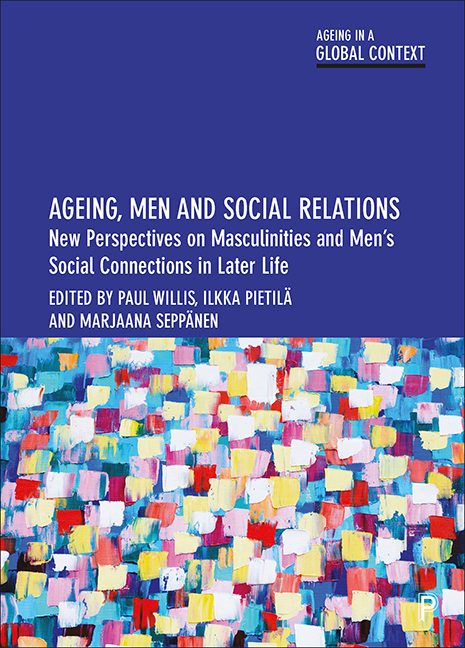 Ageing, Men and Social Relations
Ageing, Men and Social Relations Published online by Cambridge University Press: 18 January 2024
Introduction
Friendship among men is a fundamental dimension in the formation of male identities and the production of gender and social relations across their life course. Early understandings in relation to the prevalence and importance of friendship networks indicated that community networks had declined along with friendship opportunities, with individuals becoming increasingly isolated to the detriment of the individual and society (Putnam, 2000). However, more recent research suggested that individuals are linked, and their health, actions and belief systems are influenced by friends and friends-of-friends, in a hyper-connected society (Christakis and Fowler, 2010). The importance and benefits of friendship to the wellbeing, health and happiness of older adults had been explored extensively across several disciplines (Okabayashi et al, 2004; Li and Liang, 2007; Allan, 2010; Huxhold et al, 2013; Blieszner, 2014). Adults are evidenced to share normative expectations in relation to friendship, with values of respect, trust and support identified as fundamental to friendship regardless of gender, sexual orientation, age or ethnicity (Felmlee and Muraco, 2009; Galupo and Gonzalez, 2013). In later life, friendships are linked to increased happiness and health for the older individual, perhaps even more so than family relationships (Chopik, 2017). In summary, friendship is often seen as a panacea for many of the perceived ills associated with older age as friendship might stave off loneliness, passivity and the associated negative health effects.
This chapter examines the social construction of older age and later life by men (aged 65 and over) in the context of a particular ‘type’ of friendship, namely, intergenerational friendships. Intergenerational friendship here is understood as a friendship between a younger and a significantly older adult, who are not related. Intergenerational friendship is a useful ‘lens’ to explore how older men construe themselves in relation to younger people, and in the context of the arguably ageist, age-segregated society that they live in. Ageing in contemporary societies has been outlined by Gilleard and Higgs as ‘complex, differentiated and ill defined’ (2000: 1), as contrasting expectations of older people exist. Older people are exhorted to be useful and productive members of society, for example, working as volunteers or as caregivers to partners and to grandchildren (third age), and conversely as frail, care-dependent adults, often a ‘burden’ on care and fiscal resources (fourth age).
To save this book to your Kindle, first ensure [email protected] is added to your Approved Personal Document E-mail List under your Personal Document Settings on the Manage Your Content and Devices page of your Amazon account. Then enter the ‘name’ part of your Kindle email address below. Find out more about saving to your Kindle.
Note you can select to save to either the @free.kindle.com or @kindle.com variations. ‘@free.kindle.com’ emails are free but can only be saved to your device when it is connected to wi-fi. ‘@kindle.com’ emails can be delivered even when you are not connected to wi-fi, but note that service fees apply.
Find out more about the Kindle Personal Document Service.
To save content items to your account, please confirm that you agree to abide by our usage policies. If this is the first time you use this feature, you will be asked to authorise Cambridge Core to connect with your account. Find out more about saving content to Dropbox.
To save content items to your account, please confirm that you agree to abide by our usage policies. If this is the first time you use this feature, you will be asked to authorise Cambridge Core to connect with your account. Find out more about saving content to Google Drive.